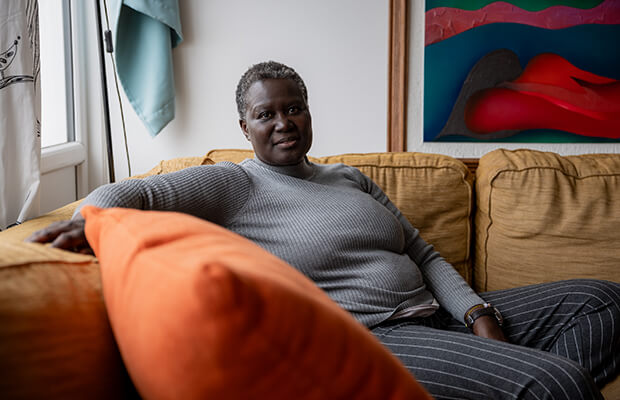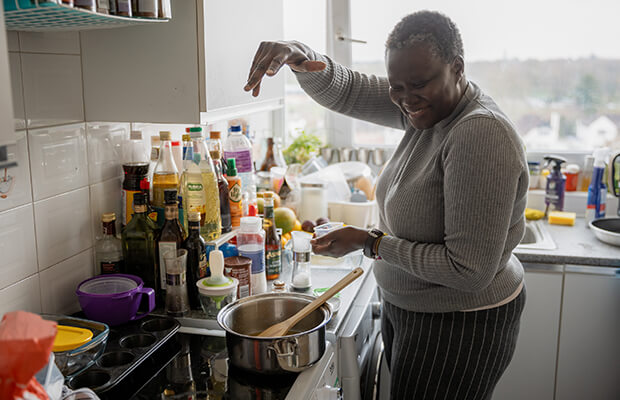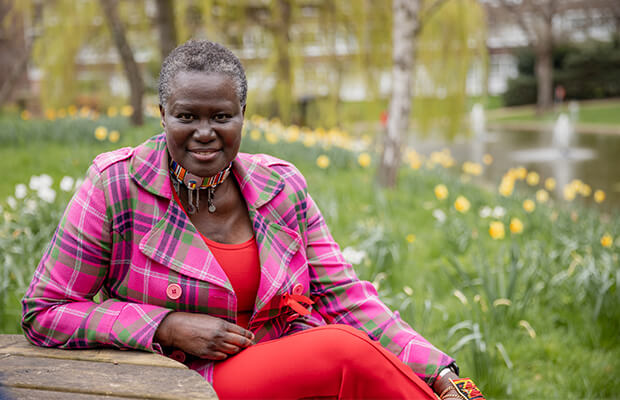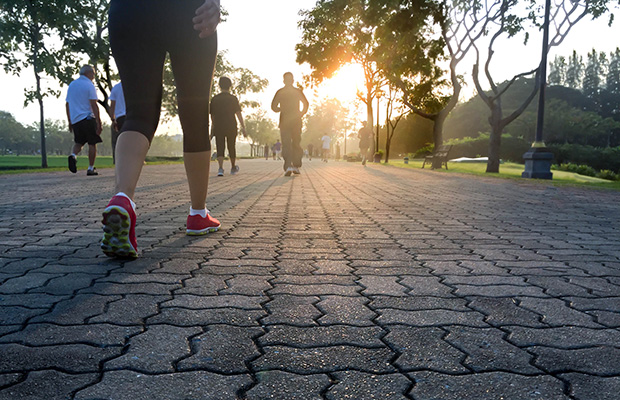“In spring 2021, after the third Covid-19 lockdown, I noticed I was getting breathless. My niece commented that I was puffing and panting when going up stairs.
Before this, I had enjoyed years of good health. I cycled from London to Paris, London to Amsterdam and even walked from London to Brighton for charity.
I was putting on weight and my joints were uncomfortable or painful. I went to see my GP, which started months of tests and long stays in hospital, as doctors tried to find out what was wrong with me.
I was initially prescribed beta blockers but at that point doctors did not know what they were treating.
From April to August, I was in and out of different hospitals. It went on so long that I worked from my hospital bed – I’m an architect.
Then one day, in August – I will always remember this – the consultant cardiologist came, shook my hand, and said, ‘I think we know what is wrong with you. You’ve got cardiac amyloidosis’.
What is amyloidosis?
Amyloidosis is caused by the abnormal build-up of a protein called amyloid in the body.
Amyloid deposits form when proteins that would normally be broken down in the body clump together and remain in the tissues.
Two main examples of amyloidosis are AL and AA. AL is caused by a problem in the bone marrow and AA is usually due to long-term inflammatory conditions, such as rheumatoid arthritis or Crohn’s disease.
When these deposits build up in organs, they damage their structure and can affect the way they work. The heart is one of the organs that can be affected.
The amyloid causes stiffening, meaning the heart cannot pump blood around the body well enough, and can lead to heart failure.
Amyloidosis is little understood but it can damage the heart

I had never heard of amyloidosis. I looked it up and the outlook did not look good. Not much is known about it, except that it is a rare condition where proteins in your body start to build up as sticky deposits that can damage tissues and organs.
Treatment has improved, but there is no cure. By then, I was more breathless and weaker, and Covid-19 hospital restrictions meant my family could not visit.
I wondered how long I had left to live
I shared my news with a kind lady who I’d met on the ward, but she was leaving that day. Trying to take it all in while I was alone was very hard. I started wondering, ‘How long do I have to live?’
In my case amyloidosis had affected my heart. Abnormal amyloid proteins are produced in the bone marrow and for the type I have, called AL amyloidosis, treatment is normally chemotherapy to stop more abnormal proteins being produced.
I had several rounds of chemotherapy over seven months. I was so unwell; sick, tired and weak, and was still in and out of hospital. When at home, I had to crawl up and down the stairs on my hands and knees.
Get support with your health and wellbeing
Sign up to our fortnightly Heart Matters newsletter to receive tips on coping with difficult emotions, looking after your health and living well. Joining is free and takes two minutes.
I’d like to sign-up
My family rallied round

I was born in Uganda and lived there until about the age of 10, when the whole family came to Europe. My father’s job first took us to Belgium and later I came to boarding school in the UK. I had to adapt to a new continent, cultures and education systems.
I put my ability to adapt to becoming ill down to that time. I immediately told my family and friends. Culturally we accept life and death are close: you cannot have one without the other. It meant we were able to discuss openly the impact of the condition on my life.
My oldest sister moved in with me to help with cooking and cleaning, and she came to hospital appointments with me. She is very practical and thought of all the things I needed to get sorted out.
She studied environmental change and disaster management – my six siblings and I call her our ‘disaster management coordinator’. My youngest sister, her husband and all my brothers visited from abroad and helped.
Basically, everybody rallied round, including friends who had clinical knowledge and that really helped me to interpret, understand and accept my situation.
I had to learn to live differently

My chemotherapy ended in February 2022. Tests showed it had worked well, and the amyloids were starting to clear from my body.
But the build-up of amyloids that had already happened in my heart means that one of my heart valves does not close properly, meaning my heart has to work harder.
This has caused heart failure where my heart does not pump enough blood around my body, and I get very tired and breathless.
I now allow myself to do things differently
Now, my biggest struggle is walking. I often stride out from my house and within a few metres I slow down completely. I now give myself permission to do things differently. If I’m tired, I rest and take things easy.
For work, I took a philosophical view of how to do architecture differently. I minimised site inspection visits, which are physically tiring, and reimagined my career.
Now I feel inspired by my variety of jobs as a freelance architect, consultant, mentor and lecturer at the University of Westminster.
I may not know how long I have to live but I want to live as well as I can. I enjoy being here, being alive, and my glass is always half full.
There are things I used to take for granted that matter more now. It could just be sitting by a window watching the weather, or simple sounds.
Walking through London recently, I heard a magpie’s song for the first time. Little things in life have become more meaningful. I have a great life.”
British Heart Foundation-funded researchers focus on amyloidosis
Professor Marianna Fontana is a cardiologist based at the National Amyloidosis Centre (NAC), the only specialist centre for amyloidosis in the UK.
She is a BHF-funded researcher aiming to find better treatments for cardiac amyloidosis, including the AL type. The standard treatment is chemotherapy to suppress the production in the bone marrow of this abnormal protein.
Professor Fontana says that better treatments are urgently needed. “We have an effective way – chemotherapy – to switch off amyloid production. But we do not have a good way to remove existing deposits, which damage organs, including the heart.
“So even if the chemotherapy works well, the person is still left with the current deposits and the damage they can do,” she explains.
“Through imaging techniques we developed at the NAC, we now know that some people’s own immune systems can clear amyloid deposits from the body. But this happens very slowly over several years.
“However, we found three patients who developed antibodies to the amyloid and were able to clear it completely and rapidly from their body.
“We want to recreate the natural process that happened in these patients. If we can find the right antibodies it could change everything – it could completely cure this disease.”
What to read next...










